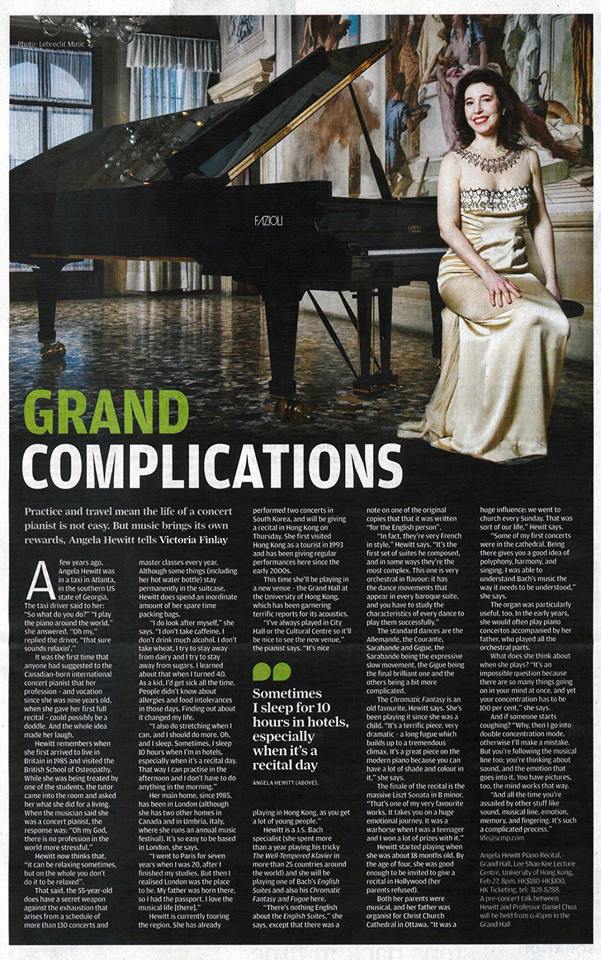南華早報 South China Morning Post
Grand Complications
By Victoria Finlay
25 FEB 2014

Practice and travel mean the life of a concert pianist is not easy. But music brings its own rewards, Angela Hewitt tells Victoria Finlay
A few years ago, Angela Hewitt was in a taxi in Atlanta, in the southern US state of Georgia. The taxi driver said to her: “So what do you do?” “I play the piano around the world,” she answered. “Oh my,” replied the driver, “that sure sounds relaxin’.”
It was the first time that anyone had suggested to the Canadian-born international concert pianist that her profession – and vocation since she was nine years old, when she gave her first full recital – could possibly be a doddle. And the whole idea made her laugh.
Hewitt remembers when she first arrived to live in Britain in 1985 and visited the British School of Osteopathy. While she was being treated by one of the students, the tutor came into the room and asked her what she did for a living. When the musician said she was a concert pianist, the response was: “Oh my God, there is no profession in the world more stressful.”
Hewitt now thinks that, “it can be relaxing sometimes, but on the whole you don’t do it to be relaxed”.
That said, the 55-year-old does have a secret weapon against the exhaustion that arises from a schedule of more than 130 concerts and master classes every year. Although some things (including her hot water bottle) stay permanently in the suitcase, Hewitt does spend an inordinate amount of her spare time packing bags.
“I do look after myself,” she says. “I don’t take caffeine, I don’t drink much alcohol. I don’t take wheat, I try to stay away from dairy and I try to stay away from sugars. I learned about that when I turned 40. As a kid, I’d get sick all the time. People didn’t know about allergies and food intolerances in those days. Finding out about it changed my life.
“I also do stretching when I can, and I should do more. Oh, and I sleep. Sometimes, I sleep 10 hours when I’m in hotels, especially when it’s a recital day. That way I can practise in the afternoon and I don’t have to do anything in the morning.”
Her main home, since 1985, has been in London (although she has two other homes in Canada and in Umbria, Italy, where she runs an annual music festival). It’s so easy to be based in London, she says.
“I went to Paris for seven years when I was 20, after I finished my studies. But then I realised London was the place to be. My father was born there, so I had the passport. I love the musical life [there].”
Hewitt is currently touring the region. She has already performed two concerts in South Korea, and will be giving a recital in Hong Kong on Thursday. She first visited Hong Kong as a tourist in 1993 and has been giving regular performances here since the early 2000s.
This time she’ll be playing in a new venue – the Grand Hall at the University of Hong Kong, which has been garnering terrific reports for its acoustics.
“I’ve always played in City Hall or the Cultural Centre so it’ll be nice to see the new venue,” the pianist says. “It’s nice playing in Hong Kong, as you get a lot of young people.”
Hewitt is a J.S. Bach specialist (she spent more than a year playing his tricky The Well-Tempered Klavier in more than 25 countries around the world) and she will be playing one of Bach’s English Suites and also his Chromatic Fantasy and Fugue here.
“There’s nothing English about the English Suites,” she says, except that there was a note on one of the original copies that that it was written “for the English person”.
“In fact, they’re very French in style,” Hewitt says. “It’s the first set of suites he composed, and in some ways they’re the most complex. This one is very orchestral in flavour: it has the dance movements that appear in every baroque suite, and you have to study the characteristics of every dance to play them successfully.”
The standard dances are the Allemande, the Courante, Sarabande and Gigue, the Sarabande being the expressive slow movement, the Gigue being the final brilliant one and the others being a bit more complicated.
The Chromatic Fantasy is an old favourite, Hewitt says. She’s been playing it since she was a child. “It’s a terrific piece, very dramatic – a long fugue which builds up to a tremendous climax. It’s a great piece on the modern piano because you can have a lot of shade and colour in it,” she says.
The finale of the recital is the massive Liszt Sonata in B minor. “That’s one of my very favourite works. It takes you on a huge emotional journey. It was a warhorse when I was a teenager and I won a lot of prizes with it.”
Hewitt started playing when she was about 18 months old. By the age of four, she was good enough to be invited to give a recital in Hollywood (her parents refused).
Both her parents were musical, and her father was organist for Christ Church Cathedral in Ottawa. “It was a huge influence: we went to church every Sunday. That was sort of our life,” Hewit says.
“Some of my first concerts were in the cathedral. Being there gives you a good idea of polyphony, harmony, and singing. I was able to understand Bach’s music the way it needs to be understood,” she says.
The organ was particularly useful, too. In the early years, she would often play piano concertos accompanied by her father, who played all the orchestral parts.
What does she think about when she plays? “It’s an impossible question because there are so many things going on in your mind at once, and yet your concentration has to be 100 per cent,” she says.
And if someone starts coughing? “Why, then I go into double concentration mode, otherwise I’ll make a mistake. But you’re following the musical line too; you’re thinking about sound, and the emotion that goes into it. You have pictures, too, the mind works that way.
“And all the time you’re assailed by other stuff like sound, musical line, emotion, memory, and fingering. It’s such a complicated process.”
life@scmp.com
Angela Hewitt Piano Recital, Grand Hall, Lee Shau Kee Lecture Centre, University of Hong Kong, Feb 27, 8pm, HK$180-HK$100, HK Ticketing, tel: 3128 8288. A pre-concert talk between Hewitt and Professor Daniel Chua will be held from 6.45pm in the Grand Hall

